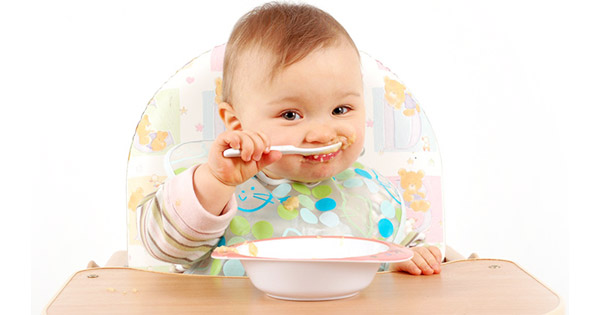Weaning - Tips and Advice

The transition from milk to solids is a lovely and exciting period in you and your baby’s life together. By the time your baby is six months, you’ll start to notice a change in appetite and your little one won’t be as satisfied with milk alone.
The best way to wean your baby is to slowly introduce a variety of solid foods to them, and though most of us know weaning is vital for nutrition and growth, it also helps improve your baby’s motor skills and speech.
It’s recommended by the Food Safety Authority of Ireland to wean your baby anytime from 17 to 26 weeks old. It’s not a cause for alarm if your healthcare professional to recommend solids before 6 months old, this is because every baby has different physiological requirements. Try not to leave it any longer than 26 weeks as risk of food intolerances and iron deficiency is higher, as well as your baby being more likely to be fussy around food.
When is my baby ready?
- They are showing an interest in the food you are eating, will open their mouth when they see you chewing
- They seem grizzly and still hungry after a feed
- They start to demand more food over a time period of more than a week
- More drooling and chewing than usual
A Calm Beginning
Set aside a day that suits you where you aren’t under any time pressure or other stress, and make sure your baby isn’t too hungry when you start. It’s best to feed your baby in an upright position on a high chair or travel chair, where baby can look straight ahead while eating. Keep quantities small, and never force food on your baby. It’s all about patience as they learn these new skills.
Try letting your baby hold and play with a spoon, and leave a gap between introducing new foods of a day or so between each one to keep an eye out for potential reactions. As soon as your baby is able to be spoon fed, space them out between milk feeds. There’s no need to add seasoning to your baby’s food, but low sodium stock cubes are safe. If you’re concerned about your baby’s reaction to lumpy textures, just add thickness to meals over time to help them get used to swallowing different foods.
If you’re still breastfeeding, remember that those nutrients are going to be vital for your baby up until they are a year old. The same applies to bottle-feeding.
HYGIENE AND REHEATING YOUR BABY’S FOOD
Be sure that you are giving your baby food that is fresh and has been hygienically prepared and stored. Make sure to cover and refrigerate all leftovers. If you’re freezing meals for convenience, store them in small portioned containers or bags and defrost them in the fridge. Make sure you reheat properly and ensure it cools to a proper temperature before feeding your infant. You can test it on the inside of your wrist - if it’s comfortable for you, you can go ahead and feed. Never reheat baby food more than once!
BABY LED WEANING
This is where you skip the purée stage and go straight to finger foods, allowing your baby to explore, touch, smell, and taste food you are eating. Keep an eye out for when your baby is picking up anything and everything and trying to chew it - this is the perfect time to start this process.
Try:
- Lightly toasted pieces of bread
- Small chunks of ripe mango, pear, banana or seedless watermelon
- Small , soft pieces of broccoli or cauliflower
- Pea-sized chunks of cooked soft meat like chicken and mincemeat
VITAL NUTRIENTS FOR A BALANCED DIET
Protein
This should be included in two meals of your baby’s daily intake from 6 months on.
- Chicken or turkey
- Oily fish/white fish
- Beef/pork/lamb
- Pulses - peas, lentils and chickpeas
- Eggs
Fatty Acids
These include Omega 6 and 3. Naturally found in breast milk and added to formula, you can also find them in oily fish like mackerel and salmon and vegetarian food like linseeds, walnuts, flaxseeds and rapeseed oil.
Foods For Energy
Small quantities of fat are important for nutrient absorption.
Try:
- Pasteurised dairy
- Smashed avocado
- Eggs
- Low-salt spreads and butter
Vitamin D
This is vital for healthy bones and may prevent other illnesses and infections. Found in oily fish and eggs, babies should also be given a Vitamin D supplement providing 5 micrograms every day until they are at least a year old, to give them the best start possible.
Foods to Avoid
Although you want your baby to try as many new flavours and textures as possible, it’s important to steer clear of these foods in the weaning stage
- Excess sugar
- Mould ripened cheeses
- Salt
- Whole nuts
- Lightly cooked eggs
- Honey
Top Must Have Weaning Products:
- Beaba Babycook Duo: Featuring a 4-in-1 cooking process including, defrosting, reheating, cooking and food preparation, cooking for your child has never been easier. Producing quality meals in as little as 15 minutes
- Chicco Pocket Snack Booster Seat: New lightweight, compact booster seat from Chicco! Perfect for Baby’s first meals on a chair… or at the table with the family, at home or out and about!
- Beaba Silicone Meal Set (4 pcs) - Eucalyptus: The Beaba Silicone Meal Set is made from super supple silicone, and comes in funky, fun colours in keeping with your Beaba kitchenware!
Back to Post Pregnancy Category
